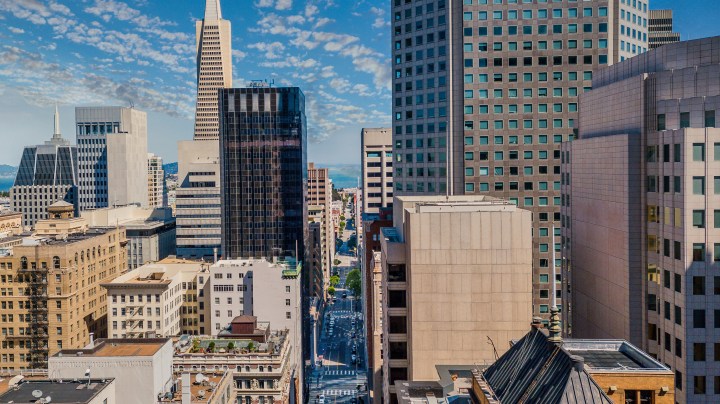
Move to “right-sizing” changes commercial real estate landscape in San Francisco
Move to “right-sizing” changes commercial real estate landscape in San Francisco

The buzzword in commercial real estate these days is “right-sizing” — finding the appropriately sized (smaller, usually) office space for a hybrid workforce.
Maybe no U.S. city will feel the impact of “right-sizing” more than San Francisco, which has consistently trailed New York, Los Angeles and Austin, Texas in weekly office attendance throughout the pandemic. City officials expect 15% of the city’s workforce to be permanently remote. And with omicron now mostly in the rear-view mirror, a long-delayed shift to hybrid work is already reshaping the rest of the city’s economy.
You can see the change in the city’s Financial District, where Kai Shane took me on a tour of a pretty rare sight in San Francisco these days: a little less than 200,000 square feet of office space that a company actually wants.
“Just imagine this all full of really cool furniture, people enjoying, hanging out,” Shane said, pointing to a vacant floor in the podium of 101 California Street, a 48-story downtown skyscraper. A handful of construction workers in hard hats traipsed around the six-floor annex.
Shane heads real estate operations for Chime, a fintech company that leased this space last fall.
“We got a killer deal,” Shane said. While she couldn’t share specifics, Shane said the company was paying about the same amount for the prime location right off the subway as it was for their old building, a smaller space with fewer amenities, further from public transit.
Shane is overseeing the renovation of Chime’s new headquarters. On the first week of June, the company moves in and the great hybrid experiment begins. In addition to a dining hall and multiple lounge areas, the new office will have way more meeting space and proportionally fewer individual workstations.
Since the start of the pandemic, Chime more than tripled its Bay Area workforce, to about 700 employees. Shane expects an average of 500 or so to show up to the new headquarters every day, with peak attendance Tuesday through Thursday.
That means that in a non-hybrid world, 200 more “Chimers” would be spreading their money around downtown, grabbing morning lattes, buying overpriced salads or drinking afternoon cocktails at Sam’s Tavern.
“Fridays have fallen off the map,” said Peter Quartaroli, owner of Sam’s Tavern and Sam’s Grill and Seafood Restaurant next door. “So now Tuesday seems to be our big day. Mondays are a little slow to get started for the week.”
Downtown businesses like Quartaroli’s are at a disadvantage. While restaurants in more residential neighborhoods could benefit from a hybrid workforce, not many people live downtown.
That’s why Robbie Silver, head of the San Francisco Downtown Community Benefit District, is trying to make downtown less … downtown-y.
“Downtown San Francisco has relied on the 9-to-5 work population for decades now,” Silver said. “So we need to pivot, and we need to pivot quickly.”
In Silver’s vision for downtown’s future, that means more nightlife and pedestrian-friendly streetscapes. He’s working with Sam’s Grill and neighboring restaurants to enhance lighting and other amenities for outdoor dining.
But beyond making downtown more of a destination to play, Silver really wants more people to live here. He points to a downtown fire station a developer wants to transform into a mixed-use property.
“The idea is to have emergency services, either housing or hotel units, as well as amenities,” said Silver. “I think this is the future of downtown.”
For all the hand-wringing about the future of downtown and the city as a whole, there’s a certain type of San Franciscan who thinks the entire city was overdue for a little right-sizing.
Gretchen DeKnikker has lived here for 26 years. “I think it’s fine,” she said. “It was a crowded city, and so fewer is not a terrible thing.”
DeKnikker was waiting outside Sam’s Tavern. When she walked in to meet a business associate, she didn’t have to wait for a table.
There’s a lot happening in the world. Through it all, Marketplace is here for you.
You rely on Marketplace to break down the world’s events and tell you how it affects you in a fact-based, approachable way. We rely on your financial support to keep making that possible.
Your donation today powers the independent journalism that you rely on. For just $5/month, you can help sustain Marketplace so we can keep reporting on the things that matter to you.











